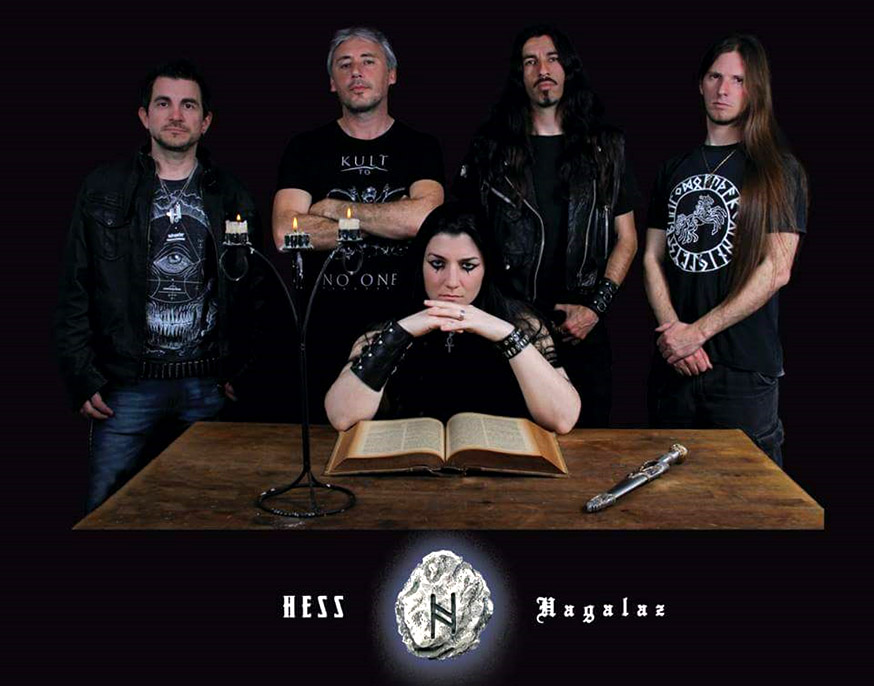The following interview is done with Melani Hess. This interview was originally done for the 'zine Der Wehrwolf #5 (Germany).
- Read the original German version here -
*Special thanks to the editor W. Wolf

Circa 2015
The following interview is done with Melani Hess. This interview was originally done for the 'zine Der Wehrwolf #5 (Germany).
- Read the original German version here -
*Special thanks to the editor W. Wolf

Circa 2015
The name 'Hess' rings with a familiarity throughout the civilized world. Rudolf Hess and his famous flight for peace. His inhuman imprisonment and murder. The name Hess also represents an Argentine classical metal band led by Melani Hess, a descendent of the famous pilot, and a trained soprano and opera singer.
'I mean, people can not live without music. While singing, I can travel through my past lives and feel the essence of the music that embraces my immortal soul. Thousands of melodies of ancient times are the inspiration to create my music. While singing, I can reach the spirits of my ancestors who answer me that there is a better world: those who live in my mind and have to show in this present life.'
- Melani Hess
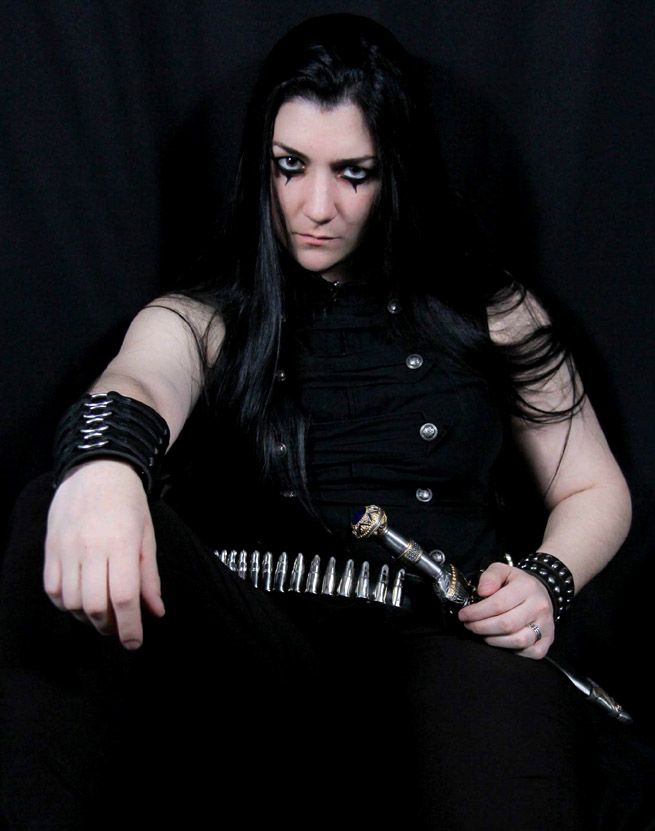
1. Melani, thank you very much for this interview. First of all, what can you tell about the name Hess?
What is the origin of the name and what is its connection to Germany?
1. Thank you! Well, as many of you might know, Hess is a German name coming from the region of Hessen. Hessians come from an ancient tribe of this region called Chatti or Hatti, which in turn had been linked to the Hittites and Assyrians. Some time ago, I published an article in English about this. You can read it if you wish to have more information:
1.1 How proud are you of your origin?
1.1. I am very proud! Especially because of the love I feel for Germanic Culture, its History, its language and Literature.
2. You were born and raised in Rosario, Santa Fe/Argentina. How do you remember your childhood, or what special memories do you have about your childhood or your grandparents?
2. I had a happy childhood. I don’t remember having had a close relationship with my grandfather Hess, for he wasn’t very expressive and I wouldn’t see him frequently. I regret not having been able to know more about our ancestors. That’s something I cannot forgive him for.
2.1. At the age of 16 you took singing lessons with Yamile Baidón and sang classical arias in her exhibitions, "The Queen of the Night" by Mozart as well as some others. How did your interest and fascination with classical music and music in general come about?
2.1. As regards to Classical Music, I came across it in my early teenage years, when I had access to the internet for the first time. I don’t quite remember in what way that encounter took place. But listening to classical arias in German made a huge impact on me; it was a starting point for setting myself forthcoming challenges in the field of lyrical singing.
With respect to Heavy Metal, I was born listening to this music. This relationship has always been natural to the extent that it makes me feel at home wherever I may be.
2.2 What did your previous singing career look like before HESS?
2.2. Before HESS, I was part of what had been my first band. It was a Nightwish tribute band called Euphemya. The band was formed in 2007, but we didn’t have many shows. And due to several disagreements in terms of personal goals, I decided to form my own band in 2010 with people that had the same energy I had to play heavy metal with passion.
3. Art, whether it is music, film or in the form of a book or painting, in all matters, art can be very influential. Because everything that art represents has a special impact on our life and environment. Art is, above all, meant to deepen a certain freedom and beauty.
How do you feel art influences our reality?
3. All forms of art at any given point in time and place have an impact on a minor or major scale in each society. For art is a manifestation of our culture – a manifestation that bears a particular ideological meaning, which could have both a positive or negative effect on history.
3.1. Can you tell us about the art that you create and publish for yourself?
3.1. My art represents who I am in the most authentic possible way. I am not interested in creating artificial art trying to show myself as someone I am not in order to satisfy the masses and in that way gaining riches dishonestly.
3.2. Art, its freedom, censorship and prohibition... art has been censored, banned or even destroyed. No matter whether in dictatorships or in democratically inclined countries under the cover of a false democracy (scheindemokratie).
3.2. It is an extremely delicate issue and very difficult to tackle objectively. I believe that one’s art can manifest itself freely inasmuch as it doesn’t physically harm another being (animal or human). If art means moral damage or offends another being, I think that it nonetheless has its raison d'être; even though this might generate xenophobic hatred and escalate into physical damage. It is for this reason I said it is a very delicate subject.
4. Now let's get to the HESS debut album "Hagalaz", which got relatively good reviews. Nevertheless, as far as your music or you are concerned, you are relatively unknown here in Germany and I do not know of any reviews of your music and songs. Although I'm not surprised with the politically correct attitude of the press and magazines where the name Hess triggers alarms and sirens begin to howl.
4. Fortunately, Hagalaz has received a lot of positive responses, both musical and literary. Its songs tell of historical events, legends, stories from Germanic, Egyptian and Scottish literature. The album is highly varied lyrically, but at the same time the songs possess elements or symbols that are interrelated, thus making up a rich source of symbolism that invites the curious reader/listener to read and investigate more about them.
Although there are controversial symbols, it is left to the interpretation and study of each listener to find their coherence – provided that they had read entirely each literary piece, of course.
https://www.facebook.com/notes/hess-melani/how-the-assyrians-hittites-chatti-and-hessians-are-related/378549252301645
When I compose, sing, or write, I do it to know my inner self better; to connect myself to my ancestors and listen to their teachings; to learn who I was and who I must be. It is through art that I live, breathe, seek to comprehend the cosmos.
What is your opinion about censored or forbidden art? How far should artistic and independent development go? Should there be natural limits or do you find that art should be free of censorship and prohibition or do you consider it important to prohibit or censor certain things?
On the cover of Hagalaz, when one looks at the motif and drawing, a bookshelf is drawn on the back of the album with books like "Faust" by Goethe, H.P. Lovecraft as well as "Mein Kampf" and others. Also seen is an aircraft similar to a Messerschmitt Bf 110 with which Rudolf Hess once went to England.
First of all, what do you think of this politically correct "disease"?
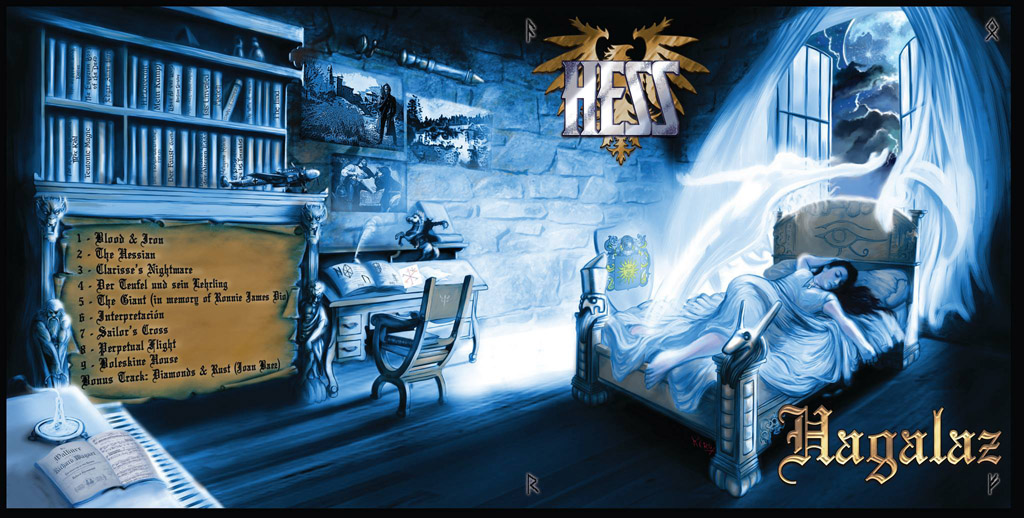
[Click on image to enlarge!]
4.1. There isn’t much to say. As I previously stated, it is through art that I reveal who I am; my passions, my ancestor’s teachings, my Jungian shadow.
4.2. To come back to the book "Mein Kampf". Here in Germany, this book was forbidden for decades and not for sale to the public. This year an official new and commented edition of "Mein Kampf" will be released here in Germany.
4.2. Books such as The Bible, for instance, which glorify mass genocide, moral and physical violence towards women, racial discrimination that ratifies who lives and who dies on Judgment Day or during the Great Deluge, are profitably and proudly produced massively. And nobody says anything. Shouldn’t these books be banned too?
4.3. "Hagalaz" was self-published. Are you planning on continuing to publish your own music in the future and thus exclude a record company?
4.3. It’s difficult to find a good record label that could support us. Besides the cost that most of them require. Still, we don’t rule out the future possibility of working with a record company.
4.4. Having a record company can have positive but also negative effects, since you are bound by a contract which may have an impact on lyrics, songs and music.
4.4. I would tell them to fuck off.
5. Here in Germany we have a problem of dealing with the past, of history and the experience in itself, I believe you understand what I am talking about here. Also, one can not say or write certain topics or an opinion on various historical events. This is again a politically correct problem of modern times. I do not mean only the German history of 1914 - 1945, for example, but even before that time.
5. I’m interested in the whole of history which encompasses all cultures, whether I agree or not with their beliefs. German history, culture and literature really fascinates me. And even though XX century wars are the most recent and “famous”, the periods that interest me the most are the most ancient – when the Germanic peoples gradually developed and created their precious values such as honor, fraternity, hard work and passion.
5.1. "A nation that does not honor its past has no future!" said Goethe and "A people is not ruined by lost wars, but by the fact that it invalidates itself from within, renounces its language, the language of its poets and thinkers, thus committing high treason to itself" said Josef Weinheber. Here is the problem of history and the past.
What is your opinion on these two quotations?
5.1. I completely agree with both. To honor our ancestors is vital for us to know where we come from, who we are and what we will pass on to our descendants. We are the reason for which they have existed, for they created their life path thinking of our future.
With respect to poets and thinkers, it is related to what I said before about art as a cultural manifestation. We express art through our language, and at the same time art provides us with a voice through which we share our message. In the absence of our honor and of our voice as thinkers, our community falls into a meaningless cultural void.
6. But now back to "Hagalaz"! The album contained nine songs and cover of Joan Baez's "Diamonds and Rust". I would like to talk about one of your songs, the first being "The Devil and his Apprentice", that you sang completely in German. "... teach me all secrets, take me in the white wide field, we will win the war, we shall find the sacred lance, singers sing the moon, in honor of the Lord's people ..." - In the song and the lyrics I find a special interpretation, it is mysterious, occult perhaps, with a vision of winning a war, the lance of Longinus and the vision of the chosen people as well as the Vril secret society project. Also the last words of the song are "He speaks to me freely, I do not regret anything".
6. This song intertwines historical events and references to Germanic history and literature of a similar theme. I humbly invite and challenge the reader/listener to discover and understand those references for themselves.
6.1. As an artist or as a musician, whether you like music as a hobby or perhaps more, you can be inspired and influenced by certain things.
6.1. The emotional process varies depending on the songs. Sometimes there are historical or literary themes that emerge which require extensive study and reading. Other times, they stem from the unconscious on the dream plane. And other times, they unexpectedly appear as a result of strong emotions during a particular time in daily life.
Although we talked already about the topic of prohibition, what is your opinion of a book that one must withhold from a people or where one was afraid of a publication?
How would you, as the creator of your music, react to something like this?
How far and wide are you interested in German history? What time is the most interesting for you?
Well, finally to the question, what is the subject of this song and lyrics?
How is the process of creating a song for you? I mean the process from an idea to a musical note.
How big of an emotional process is it to work on a song?
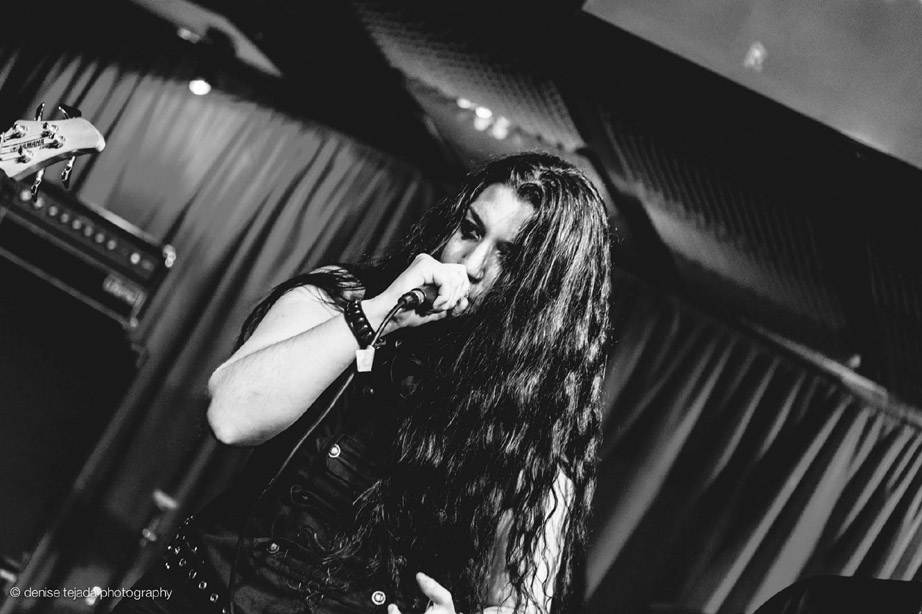
6.2. The eighth song "Perpetual Flight" deals with a certain historical event, Rudolf Hess' flight to England in May 1941. What is the meaning of this song for you?
6.2. It is interesting to notice that you have asserted what the song is about when there is no direct reference to such event in it. But yes, Perpetual Flight is about that exactly. And this is for me what it means to honor our ancestors. Not necessarily praising or staunchly defending their beliefs – which have been deliberately distorted – but trying to understand and honor their existence.
6.3. Condemned in Nuremberg and murdered after forty-six years of imprisonment. How do you feel about his flight as well as with him as a person and the story around Rudolf Hess?
6.3. I wouldn’t say I know that much, because I don’t know to what extent history books reflect reality as it was. However, based on what I know for sure, I believe that his punishment did in no way fit his crime. I believe that another person or other people deserved that fate the most. He faced it with the Germanic tenacity that characterized him, no doubt. What’s ironic and unfair is that the ones that condemned him ended up resembling their enemies.
7. To stay with history, it is no secret that during or after the Second World War, Germans emigrated to South America. Also under the label 'rat line' which was mostly a route through Italy and largely to Argentina.
7. Certainly at that time, a lot was discussed within the media of my country. Germany was devastated after WWII (and after WWI too) and her citizens helpless. Undoubtedly, many emigrated to Argentina in search for comfort and peace. Similar was the case of my ancestors, who emigrated during or after (I don’t know exactly) the Franco-Prussian war between 1870 and 1871.
7.1. Are there any reports or articles in the Argentine or South American media about this topic? If so, how does the press deal with these issues?
7.1. There are lots of articles and stories on the German communities in Argentina. In many Argentinean provinces like Misiones, Neuquén, Buenos Aires, Corrientes, among others; many German people found a home, starting their lives from scratch, founding cities and small towns that developed propitiously.
7.2. There are also various theories about the last days of 1945 in the bunker of Berlin. Here I would like to talk briefly about Hitler's possible escape to South America/Argentina. Do you believe in it and consider it probable or only a myth?
7.2. There are many people who claim he really came to Argentina and died here. Others state that he had such bad health that it is possible he might have wanted to commit suicide to make sure his enemies wouldn’t get his body. It is for these reasons that one loves and hates history. On the one hand, one is annoyed by the fact that such important historical events have been hidden or twisted. On the other hand, it poses us with a challenge to find out for ourselves. Yet that requires a lifetime career and with no guarantee whatsoever of finding the truth. This is why there is no need for me to believe which was the truth, but to take both events as possible according to existing evidence.
8. Let's talk about South America, Argentina, how is life there? How is the social and economic situation and the circumstances of life?
8. Life in Argentina is as tough as in any other part of the world. Many people are very hard-working for a miserable salary that is only enough to pay the state’s taxes. Others are a bit luckier and can afford to go on holidays at some time of the year. There is also a lot of poor people in different Argentinean provinces.
8.1. How big is the cultural and ethnic divide there? Or is there hardly any difference to be felt?
8.1. In Argentina there is a highly marked difference between social classes. So as to meet their selfish and ambitious objectives, contemporary governments have taken charge of creating a serious division in society, to the extent that the middle class is confronted with the lower and upper classes. This causes a lot of discomfort and discrimination, consequently a lot of insecurity in the streets. I think that the mindset of people from any social class has been corrupted and blinded by the capitalist ambition of wanting to keep up with the Joneses – in many cases, at the expense of life itself.
8.2. Your country has recently been governed by Mauricio Macri, before him by Cristina Kirchner. How much interest do you have in politics, the economy and the system?
8.2. I am greatly interested in politics. That’s why I allow myself to have long periods of silence before giving a properly informed opinion. Within only one month after the election of our new president, this time right-wing, it wouldn’t be wise or possible to offer you a coherent and accurate view on the future of our country. Let’s hope that every change will be for the best and geared towards putting an end to social division.
In mid-2015, in the Argentine province of Misiones, three medieval buildings/ruins were discovered by archaeologists in the jungle, which may have housed German fugitives at one time.
Maybe you know more about it? What about the Argentine media? Is anything known or is the press and the media inventing another fairy tale?
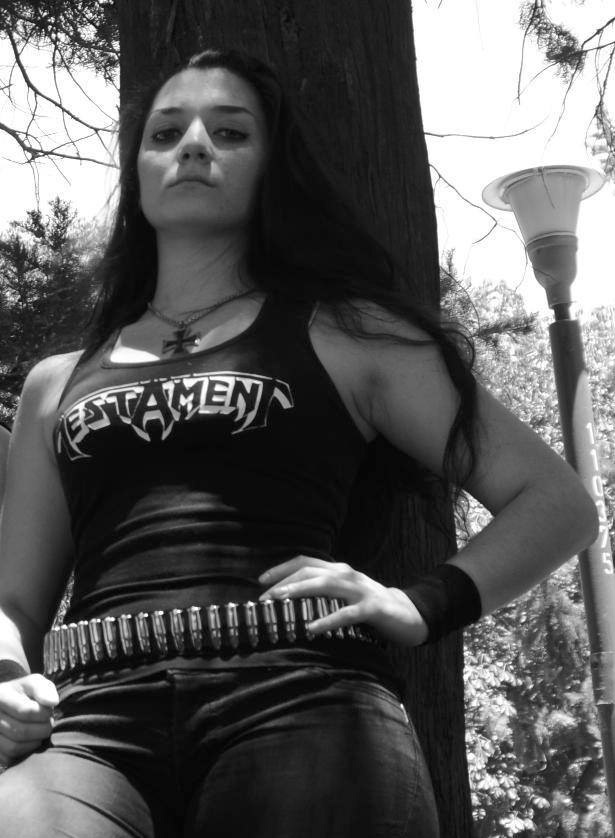
9. Of course, since the beginning of time there had always been a dark side in human nature and also corruption. There has always been a pursuit of power and wealth.
9. I agree with the fact that throughout the history of each civilization there are new and abrupt changes, sometimes similar or unpleasant changes. I believe that the fact we feel things have worsened is because facing them day-to-day makes it all the more shocking than something that took place a (long) time ago.
But if one stops to think, during the Middle Age there was no moral code whatsoever; there were no human rights, for example. Atrocious things happened and it was extremely difficult to get help or comfort from the State which seemed almost ghostly to middle and lower classes, since meeting a King or Emperor wasn’t a common occurrence; news would take months or even years to arrive. These were really hard times.
9.1. "Big Brother is watching you", from the novel "1984" by George Orwell is nowadays a sad reality. What is your opinion about this and how do you deal with it?
9.1. Yes, I agree. Anyhow, I think that the reality in which we live nowadays is Huxleyian rather than Orwellian, so to speak.
In his novel 1984 (1949), which is fascinating, Orwell shows people as being deprived of access to literary and academic knowledge such as the reading of books for instance. Now then, Aldous Huxley in his novel Brave New World (1932) portrays his characters as individuals lacking identity, who do not feel the need to read a book or admire nature because they deem that obscene, absurd, unnecessary. However, they prefer to lead a life in which idleness and capitalist consumerism are their religion. If we compare these two realities, I think that the most accurate… after 84 years… is still that which Huxley warned us with bitter sarcasm.
10. Now I would like to talk about something difficult in this day and age. Race and racism. Racism is not always the same, there is religious, political and also natural racism, whereby only the last is based on verifiable and identifiable facts. The concept of a breed therefore comes from biology and can therefore only be applied in this area. But it does not mean that one reduces others because of their origin, but the differences are felt and exist.
10. Although there is always a racist element within us all, depending on the experiences we go through. Nowadays, we know of cases where belonging to a certain race or ethnic group does not make you a better or worse person, either personally, affectively, or professionally.
I think that nationalism is healthy to a certain extent. To honor our forefathers, our fatherland, to learn their stories, etc., is perfectly harmless and honorable. Now, causing pain to other people for something their ancestors did to us, only leads us to our own destruction, or that of our people. Wars aren’t over because this stance is still maintained.
11. To put aside these topics and to come back to you, what interests do you have in life?
What inspires you, for example? What is important to you?
What are your goals in life?
11. My interest is to go on composing, sharing music and keep on writing in order to continue transmitting my message, which I always try to keep present in my honest daily discourse.
11.1. What are your favorite books, films, personalities and places?
11.1. It’s not easy to choose one favorite book, but I think the one that impacted me the most - not because of its length, since it is quite brief – has been The Kybalion. Other books I am really passionate about are “Archetypes and the Collective Unconscious” by Carl Jung and also “Isis Unveiled” by Blavatsky.
Movies I’ve really enjoyed were Gladiator, Pulp Fiction, the Godfather, Young Frankenstein, Whiplash, Ong Bak, Fight Club, among others.
12. You are already often in front of an audience with HESS. How important is this kind of stage presence and what is your feeling about being in front of an audience?
12. A writer or singer without his/her audience is no one. When one composes or interprets art, one does it bearing the reader/listener in mind, so that he or she sees you, reads you, listens or interprets your art in their own way. I am deeply interested in the audience’s point of view - be that positive or negative criticism, it shall always be welcome.
12.1. Before we come to the end of the conversation, what are your musical plans for the future? Will the new album be different? If so, in what ways?
12.1. We are still getting to know each other with our new band formation. We have a new drummer and until he adapts himself to us and we to him, we won’t start creating new stuff. But as soon as we solidify again with the hail from Hagalaz, we shall be set to work on new songs (which exist and are awaiting).
12.2. In the words of Richard Wagner, "The artist, who is fully aware of his perception, is the only one who can successfully exert himself as the master of the style of his epoch, and only he who, in turn, is concerned with the importance of style is conscious of the fact that he can bring his inner sensation to external perception."
12.2. Well, I think they are really nice and optimistic words. Although our music style, heavy metal, is not heard widely, especially in our country; so that it makes it difficult to succeed on a large scale. Anyway, without thinking too much of ourselves, we are proud of what we have achieved as a band and we are aware of how important our message is.
Thank you!
The cultures that we have known and the consciousness of identity are disintegrating and disappearing. The situation in which we find ourselves today is comparable to the decline of civilizations over the course of history.
And the strange thing is that these moral and social changes are moving faster and faster. For example, things have changed so much since my childhood. Much of morality and what was taught to us at that time is now frowned upon and considered bad or even dangerous.
When I think back and remember how we behaved, the doors to our houses and apartments were unlocked. Of course, at that time there were also robberies, brawls and worse. But today you cannot even leave your own door open.
Nowadays gangs dominate various streets and certain cities, drugs are dominating more and more the nightlife. Robbery and murder are less and less deterred, etc.
How do you see this comparison in your own life, as well as the memories of your youth?
Without trying to justify the appalling atrocities that are committed nowadays throughout the world, I think that the fact that we today believe older times to have been better is because actually we have, in some way, evolved in our way of thinking and we are able to discern better between good and evil. Having a nobler conscience, we are more affected by the destructive nature of man.
What is your opinion about race and racism?
Among favorite celebrities I can include Robert de Niro, Jackie Chan, Russell Crowe, Robert Downey Jr., Vinnie Jones.
("Der Künstler, der sich seiner Anschauung vollkommen bewusst ist, ist der einzige, der sich mit Erfolg zum Meister des Stiles seiner Epoche aufwerfen kann: und nur der, welcher sich wiederum der Wichtigkeit des Stiles bewußt ist, kann es verstehen, seine innere Empfindung zur äußeren Anschauung zu bringen.")
Thank you very much and all the best!
